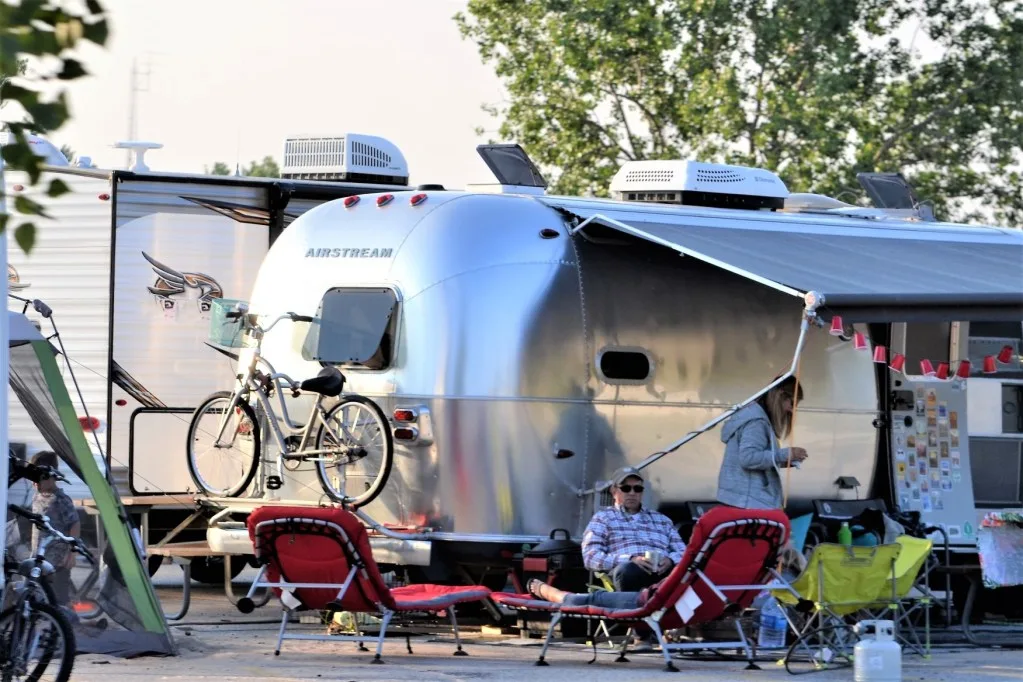Have you ever considered staying at long-term RV parks while traveling?
As full-time RVing gains popularity, more and more campgrounds allow longer stays. These campgrounds also save space for those who may need a shorter stay of a few days or a week.
Today, we’re talking about what makes an RV park a long-term campground and why you might want to avoid them.
Let’s dig in!
What Exactly Are Long-Term RV Parks?
Simply put, a long-term RV park is a place that allows RVers to set down “some roots” for a month or longer. They allow for monthly, seasonal, or annual rental agreements. This is an excellent option for traveling workers (nurses or construction crews) and anyone who wants to downsize.
Long-term parks offer exercise rooms, planned activities, and laundry facilities. These campgrounds are also known for larger sites that offer more privacy for folks. In addition, you might find small markets or restaurants on-site for added convenience.

The 5 Reasons to Avoid Long-Term RV Parks
For all the reasons you might want to avoid long-term RV parks, they also offer some benefits. One of the biggest is cost savings if you stay long enough. Some RV parks offer a discount if you stay for a week, offering a typical pay for six, get the seventh-night free deal.
Monthly or seasonal rates are almost always cheaper than daily rates, too.
#1 The Rules Are Different
At check-in, all campers receive a copy of the rules. At some campgrounds, the long-term RVers might receive a different set of guidelines than daily or weekly campers.
In most campgrounds, overnight guests cannot have more than one vehicle at their site. The long-term RVers might be able to have two vehicles and even a golf cart.
Overnight campers cannot move fire rings or picnic tables. Sometimes, they can’t have a clothes rack or canopy set up. Long-term campers may be allowed to set up their sites in any way they choose with as much decor as they like.

#2 Your Neighbors’ Sites Have That “Lived-In” Look
Almost every campground has a list of what you can and can’t do, including whether you can wash your rig. Some long-term campgrounds expect RVs to get washed once a month. Others have no regulations, and you can see moss and mildew on the campers that have sat awhile.
The RVs in a long-term park don’t always have age restrictions either. As with other vehicles, campers can show their age and begin to fade or fall apart if they aren’t properly cared for.
Some long-term sites can have full-size refrigerators, fencing, and yard ornaments everywhere. Some lots and RVs can look bad if the campground doesn’t set expectations. But some sites are well maintained with decks, landscaping, and patio sets to die for. It’s always a hit or miss depending on the site resident.
Pro Tip: Want to stay in an RV park all year long? This is how!
#3 The Park Isn’t Always Well-Maintained
Long-term RV parks are often well-loved spaces. There isn’t always a budget for infrastructure repairs, mini-golf greens, or other amenities. Those that allow overnight stays try to keep the park presentable to attract guests.
But with no “slow season,” there is constant traffic flow and people on-site. Amenities can become used and abused rather quickly.

#4 Daily and Weekly Rates Are Often Higher
As we mentioned, guests who choose to stay 30 days or longer stay at a discounted rate. Long-term RV parks make their money from the travelers and the short-term fees. For long-term RVers, utilities are often a separate fee that they pay rather than having them included in their site fee.
However, depending on the park location, overnight fees can be anywhere from $50 to $120 per night. If the campground is in a state with higher electricity fees, they may pass some of that cost to you separately instead of including it in the overnight price.
Check the campground’s website or call and ask ahead of booking your reservation to see what additional charges you might have to pay.
#5 Managers and Staff May Give Preference to the Long-Timers
RVers who’ve lived in a campground for a while will most likely have a friendly relationship with managers and staff. In fact, they may even work for the campground. Because of this, if issues arrive, the management may side with the resident more often than the overnighter who’s passing through.
Pro Tip: We took a closer look at the ins and outs of long-term RV park living to make your stay easier.
Is Staying at a Long-Term RV Park Worth It?
We think it’s worth it, depending on the park. Do your research and check the reviews on apps such as Campendium or Allstays. Read the rules and get confirmation of your total charges ahead of time.
Whether or not you choose to stay at a long-term RV park for one night or a few nights, there’s a lot to consider. We hope you have a restful and relaxing stay wherever you decide to stop.
What are your thoughts? Have you stayed at a long-term RV park? Let us know in the comments below.
We’ll Help You Find the Best Free Camping in the USA
You should give it a try!
As a matter of fact, these free campsites are yours to enjoy. Every time you pay federal taxes, you’re contributing to these lands.
Become a FREE CAMPING INSIDER and join the 100,000 campers who love to score the best site!
We’ll send you the 50 Best Free Campsites in the USA (one per state). Access the list by submitting your email below: